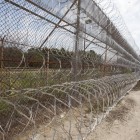
Sexual Trauma Marks Girls’ Path to Juvenile Justice System
|
When Crystal Contreras was seven and living in Los Angeles, her mother put her in the care of someone Contreras saw as a father figure. Instead, he pressured the little girl for sex. For the next three years, until she was 10, the man raped her regularly, often creeping into the house at night without her mother’s knowledge. “I never said nothing to my mom,” Contreras told JJIE.org during an interview in July. “I was scared he would kill her or hurt her or hurt the animals that I had.










